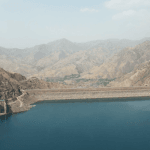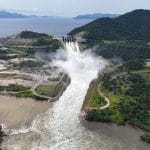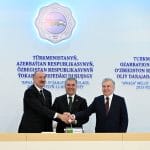Russia is claiming it has shot down nine Ukrainian drones that tried to attack the TurkStream pipeline, which carries Russian gas to Europe through Turkey, designed to bypass Ukraine. The Russian Defence Ministry reportedly said Ukraine attempted to attack a compressor station in Russia’s southern Krasnodar region on January 13, which is part of the TurkStream infrastructure, but the facility was working normally and there were no casualties.
Meanwhile, Russia reportedly launched an attack on gas infrastructure and other energy facilities in western regions of Ukraine on January 15, including a gas storage facility in Stryi, Lviv region, which Moscow said was in retaliation for the earlier attack on the TurkStream gas compressor station in the Krasnodar region.
Another massive Russian attack. It's the middle of winter, and the target for the Russians remains unchanged: our energy infrastructure. Among their objectives were gas and energy facilities that sustain normal life for our people. Over 40 missiles were launched in this attack,…
— Volodymyr Zelenskyy / Володимир Зеленський (@ZelenskyyUa) January 15, 2025
Russian gas deliveries through Ukraine ceased altogether at the start of this year after the Ukrainian government did not extend a transit agreement, which has provided political, commercial, technical and legal grounds for the transit of Russian gas across Ukraine to Slovakia, the Czech Republic and Austria during 2020-24.
“TurkStream is the last remaining operational route for Russian gas exports to Europe and one of the major routes for Russian gas supplies to Turkey (Blue Stream being another one),” Katja Yafimava, a senior research fellow at the Oxford Institute for Energy Studies, told NE Global on January 15. “If it were to be taken out of action this would clearly have an impact on Turkey and southeast European countries, most significantly Hungary, which still have significant shares of Russian gas in their balances,” she added.
TurkStream runs 930 kilometres under the Black Sea and has an annual capacity of 31.5 billion cubic meters. It begins at Russia’s Russkaya compressor station outside the city of Anapa and runs to Kıyıköy in northwestern Turkey (European side), and then up through Bulgaria, where it is called Balkan Stream, and supplies gas to Serbia and Hungary.
Yafimava highlighted the importance of this route and of supplies delivered via TurkStream for both Turkey and Hungary. “Had there been any damage done (it is understood there was no serious damage as supplies have continued unaffected), these countries would have to scramble to get replacement supplies – in form of LNG (liquified natural gas) as there is nothing much else – thus driving prices further up; there could also be physical shortages due to capacity constraints/bottlenecks,” the Oxford energy expert said.
“While supplies would have resumed after repairs, this attack – if confirmed – could be seen as an attempt to ‘persuade’ those countries that are still buying Russian gas to move away from it, as supplies could be disrupted, thus constraining their ability to make their own energy choices,” Yafimava argued.
From the Nord Stream explosions in 2022, the severe damage to the Baltic-connector pipeline, which supplies Finland with gas from Estonia, by a Chinese-flagged ship in October 2023, to the alleged sabotage of the Estlink 2 undersea power cable between Estonia and Finland in the Baltic Sea by a Russia-linked tanker late December, there is an undeclared “open season” on energy infrastructure in the eastern parts of Europe.
“The presence of an ‘undeclared’ war on energy infrastructures on the continent is an undisguised truth whose implications are rather undervalued in all Europe,” Francesco Sassi, research fellow in energy geopolitics and markets at R.I.E.-Ricerche Industriali ed Energetiche in Bologna, Italy, told NE Global on January 15, adding that energy infrastructures are not targeted just because of their incredible value in monetary terms, but also in terms of the intrinsic political value energy exports/imports have at this point in time. “The threats of attacks, even without any repercussions on volumes, make markets move instantly,” Sassi argued.
NATO to increase critical infrastructure security
At the Baltic Sea NATO Summit organised in Helsinki, Finland, on January 14, NATO Secretary General Mark Rutte, Finland’s President Alexander Stubb, Estonian Prime Minister Kristen Michal vowed to ensure the safety and security of Europe’s critical infrastructure. “Baltic Sentry” will enhance NATO’s military presence in the Baltic Sea and improve Allies’ ability to respond to destabilizing acts, NATO said in a press release. “Baltic Sentry” will involve a range of assets, including frigates and maritime patrol aircraft. The Secretary General also announced the deployment of new technologies, including a small fleet of naval drones, and highlighted that the organization will work with NATO Allies to integrate national surveillance assets – all to improve the ability to protect critical undersea infrastructure and respond if required.

Rutte also stressed the importance of robust enforcement. He highlighted how Finland has demonstrated that firm action within the law is possible, “Ship captains must understand that potential threats to our infrastructure will have consequences, including possible boarding, impounding, and arrest.”
Also in Helsinki, European Commission Executive Vice-President for Tech Sovereignty, Security and Democracy Henna Virkkunen said the EU is ready to act and to support EU Member States who have been subjects of hybrid operations in the Baltic Sea.
Meanwhile, the Kremlin stepped up its rhetoric on January 16 with Russia’s state-run news agency TASS quoting Foreign Ministry spokesperson Maria Zakharova as saying Moscow expects Turkey to take all possible measures to prevent what she called “terrorist” attacks from Kyiv on crucial civilian infrastructure in the wake of a recent such attempt on TurkStream.
Sassi cited his commentary on EklipX Research, noting that Kyiv did not comment the event and it did not denied it happened which “leaves Russia a very useful tool to further politicise and fragment the union of EU energy policies and strategies, while fanning the flames of energy nationalism.”








